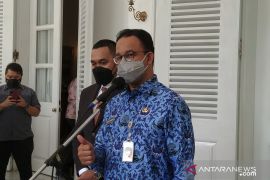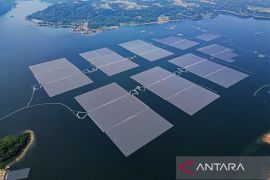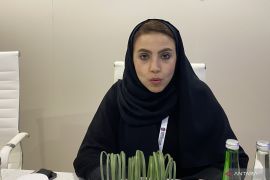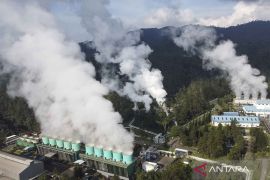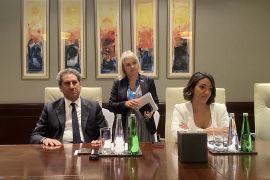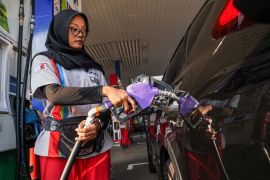However, replacing non-fossil energy is a serious matter. A slight miscalculation could lead to a waste of energy, time, and resources.
The Jakarta provincial government had gradually begun to switch to using non-fossil energy, starting from its means of public transportation: the TransJakarta electric bus, MRT, LRT, commuter trains, and even taxis.
More functional solar panels are also installed on the roofs of skyscrapers to save electricity, including for public street lighting.
The use of EBT continues to be encouraged to make the capital city environmentally friendly. However, the implementation is not that simple.
It takes a transition period to adopt energy that can be categorized as environmentally friendly and also affordable for the community.
Director-General of Oil and Gas at the Ministry of Energy and Mineral Resources, Tutuka Ariadji, stated that the energy transition period is inevitable, considering that fossil fuels, oil, and gas still have an important role before new and renewable energy, as a cleaner energy source, is available and well-accessed by the public.
Similar policies were not only adopted in Indonesia but also in countries in Asia, America, and Europe. One of the strategic policies implemented is the increasingly widespread use of natural gas.
Related news: Formula E tickets officially sold for Rp250 thousand-Rp10 million
Comprehensive Approach
Energy transition must be conducted comprehensively by taking into account competitiveness, cost, availability, and sustainability to ensure smooth transition and maintain energy security.
Carbon neutrality according to the global demands is also expected to be met by increasing the role of natural gas.
Hence, investment in natural gas projects should be increased globally by encouraging greater use of natural gas.
The National Energy General Plan, as regulated in Presidential Regulation No. 22 of 2017, projects the share of fossil energy in Indonesia's energy mix by 2050 to be at around 68.80 percent.
Currently, the share of fossil energy in the energy mix is still around 89 percent, with the share of coal at 38 percent; oil, 32 percent; and natural gas, 19 percent.
A member of the National Energy Council (DEN), Satya Widya Yudha, stated that in the energy transition strategy at both the regional and national levels, the role of natural gas was still important to meet the energy needs.
Natural gas is viewed as having the most important role because this type of energy source has a lower and cleaner carbon intensity than oil and coal.
However, as one of the oil and gas producing countries in the world, the Indonesian government should not become careless in formulating an energy transition strategy.
This is because the current national energy needs are still very high. According to the calculations of the National Development Planning Agency (Bappenas), in 2045, Indonesia's GDP will reach US$29 thousand per capita per year, thereby indicating that it will be included in the category of developed countries, with its position in the top five GDPs in the world.
Related news: Jakarta Formula E circuit to be tested in early May
Strategy
To facilitate the energy transition process, the government could start with exploring existing fossil energy by using environmentally friendly technology, such as Carbon Capture and Storage/Carbon Capture, Utilization, and Storage (CCS and CCUS).
Existing international commitments on energy transition should not necessarily eliminate oil and gas but still seek to reduce carbon emissions in order to meet the national energy needs.
During the energy transition period, it is important to find the right balance to help oil and gas production run smoothly while reducing carbon emissions according to the government’s target, Yudha emphasized.
Thus, if oil and gas production activities can run together with technology that reduces the intensity of carbon emissions alongside a change in the public’s behavior in an energy-efficient manner, then the expected balance can be achieved.
In the context of natural gas development, Yudha reminded the government to provide the necessary infrastructure to facilitate the supply of natural gas from producers to consumers in Indonesia, so it can be maximally absorbed.
The lack of infrastructure could lead to an oversupply of natural gas and end up in importing it. This condition will not provide benefits to meet the national energy needs.
Meanwhile, Executive Director of the Reforminer Institute, Komaidi Notonegoro, noted that energy transition required preparation from several existing aspects.
Hence, all efforts in energy transition need to be made gradually to avoid burden on the economy and the community’s social life.
Notonegoro later noted that the use of natural gas for domestic purposes can serve as a bridge in implementing energy transition in Indonesia.
The ultimate goal of the energy transition policy is basically an effort to reduce emission levels and not merely replacing fossil energy sources with EBT.
As the cleanest fossil energy source, the share of natural gas utilization in the primary energy mix will automatically reduce the level of emissions in the energy sector.
When reviewed from several aspects, the choice to use natural gas as a bridge to implement energy transition is viewed as being the right decision.
In fact, natural gas is considered to be able to maintain the competitiveness of domestic industries as well as the people's purchasing power as compared to the previous industry that must completely switch to using energy sources from EBT.
Hence, the government needs to take a precise step in implementing policies in the natural gas sector related to plans in increasing investment in existing natural gas projects. This aims to keep the policies from running counter to the efforts to improve the investment climate and the development of the gas industry.
Thus, the application of EBT cannot be done in a hurry, and the approach needs to be more prudent by taking into account the interests of the community in utilizing energy.
Related news: G20 drives economic recovery amid escalating challenges: Ministry
Related news: Minister highlights Indonesia's support for energy transition at IGWEL
Editor: Fardah Assegaf
Copyright © ANTARA 2022

